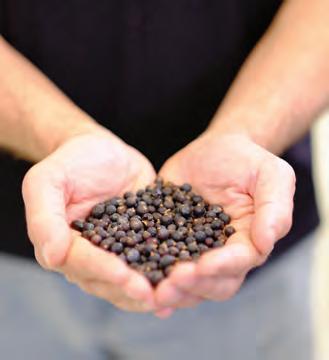
3 minute read
A GIN WITH VERY LOCAL ROOTS
from The Crest 98
BRACKENHILL CRAFT DISTILLERY MAKES FINE GIN FROM VERY SOUTH AFRICAN INGREDIENTS AND IS ATTRACTING ATTENTION FROM FAR AND WIDE
story and pictures stephen smith
Advertisement
Where science drifts into the realm of magic.” This is how Carl Grossman explains the process of distilling gin from humble maize. His passion is infectious as we walk around his small distillery in Waterfall, and he speaks of his dream for a beautiful big copper still and where he hopes Brackenhill Craft Distillery will be in a few years’ time.
Carl explains what makes his gin stand out from the rest, both in terms of how the gin is made and also how their gin physically stands out on what are very crowded gin shelves in bottle stores, thanks to its classy and local branding. “We’re one of the few distilleries that actually does the fermentation ourselves. Where most craft distilleries buy in batches of neutral alcohol and add botanicals, or flavours, to turn it into gin, weactually make our own grain-based alcohol.”
But Brackenhill has taken it one step further than fermentation. “We have a community in the Ulundi area who are growing Zulu rainbow maize for us, which we then use as the grain in our grain-based neutral spirit.” It’s a wonderful angle to have taken, both in terms of marketability but also, and more importantly, in generating jobs and an income in a rural community. An added benefit is that Zulu rainbow maize, an heirloom crop, won’t disappear as it is replaced by hybrid maize varieties. Carl also uses sorghum and barley in the grain mix.
Carl and Brackenhill Distillery’s journey to where they stand today has been one full of red tape and patient waiting. It took almost two years for their liquor license to be processed, and during that time they had to pay rent for their distillery and spend their days looking at their still standing idle. The 2020 lockdown obviously didn’t help, but now that all the bureaucracy has been overcome they are producing a tremendous tipple that is catching people’s eyes.

The machinery used is beautiful in itself.


Juniper berries are a must for gin to be called gin.

Brackenhill makes both rum and gin, and the Umqhokwane gin should be on shelves in early 2021
Carl explains the distilling process, and while there isn’t enough space on these pages to share it with you, it is interesting to see how this drink, which has become such a powerful trend, is made. For gin to legally be called gin, it needs to contain juniper berries, but on their shelves Brackenhill has up to 40 plant products, or botanicals, that are used to impart flavour into various gins.
One of these is the indigenous umsuzwane, lemon bush in English and Lippia javanica in Latin, which has become the brand’s signature. It lends a lemony note to the gin, but is also used by some local cultures as a medicinal herb. Again, a local community, this one near St Lucia, grows this for Brackenhill.
Carl is obviously proud of his product, of how it is made from scratch from indigenous grain and how indigenous botanicals have been used. Even the wood used to age the gin is indigenous, and is hung in the alcohol to impart levels of toasted flavour.
Brackenhill’s branding reminds you repeatedly of this local origin, with the Amabala Nguni cow in the label, below an African silhouette in copper hanging from the neck of the bottle. Amabala is the Zulu name given to white Nguni cows with black spots, and Carl tells a story of how he went into the field to take a photograph of a particular Amabala bull for his gin bottle.
Those who are keen to find out more about gin and distilling, or who’d like to do a gin tasting, should get in touch with Carl. He runs tastings in the distillery, and a group can even come up with their own unique batch of gin, using different botanicals under Carl’s expert guidance.
Brackenhill Craft Distillery has walked a long and windy road to get where it is today, but they have been noticed along the way both locally and internationally, and if things work out like they seem destined to, this very local brand will soon be showing off our heritage around the world.
FOR MORE INFO: Carl Grossman: 079 695 2398; www.brackenhillcraft.co.za; carl@brackenhillcraft.co.za










